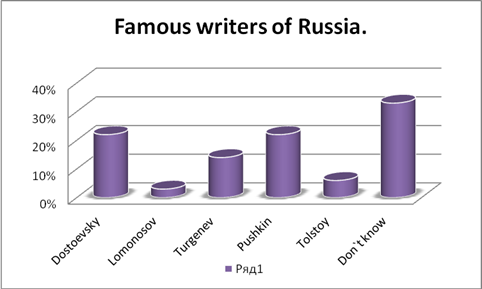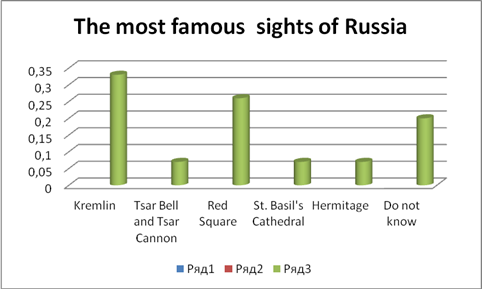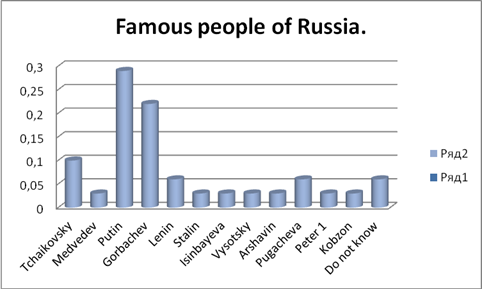

v Aims and goals
v Research methods
v Hypothesis
1. The history of the topic.
2. 50 facts about Russia in the eyes of foreigners.
Myths and Truths about Russia
v Myth: Many Russians are racists, arent' they?
v Russian women as seen through foreigners' eyes
3. Opinion poll. Russia through the eyes of foreigners
4. Conclusion
Introduction
Russia is a country that is still a mystery for many who have never visited it, or have been educated about Russia. Russian furry hats, communism, bears, cold winters, Russian mafia, and unshaven/filthy people, are some of the most popular stereotypes about Russia and Russian people. Although most of these are just jokes, some people really believe that Russia is still communist, and that bears walk around the streets. Russia is still a place that continues to mystify people, and has people laughing about Soviet-era stereotypes.
The Russians have always been interested in, not to say suspicious about, what foreigners have written about their country and its rulers, people, religion, and customs. The Russians have never had a strong faith in their country's cultural and social traditions and institutions. They lack the general sense of superiority which has distinguished the English and the French in particular, and made them immune to foreign opinion. That is why this topic has always been a great success.
We have tried to collect some information on the topic Russia through the Eyes of Foreigners using the sources of the Internet and opinions of some foreigners who we met travelling around Europe.
So our aims and goals are:
Ø To find out what modern Europeans think about Russia
Ø To find out how much knowledge of foreigners about Russia corresponds Russian reality
Ø to generalize stereotypes about Russia
Research methods
ü The analysis of resources of the Internet
ü The analysis of some publications
ü The analysis of opinions of some foreigners
Hypothesis
Very few foreigners are aware of the true facts about Rossia.a few foreigners know the truth about Russia. Much more foreigners believe in legends and myths about Russia based on stereotypes.
Some history of the topic
Curiously enough, the first objection to a foreigner's writing came not from the Russians, but from English merchants. These merchants - members of the Muscovy Company - were alarmed by Giles Fletcher's Of the Russe Commonwealth (1591). They petitioned with success that unless the book was recalled, it would “turn the Companie to some great displeasure with the Russe Emperour.” Whether Tsar Fedor was acquainted with the work is not known. However, when in 1848 a Russian scholar attempted to publish his translation of Fletcher's work, the Minister of National Enlightenment, S.S. Uvarov, informed Nicholas I of the venomous attack on the autocracy and the church. As a result, the journal was confiscated and new pages were substituted.
Western Criticism
The eighteenth century produced several examples of Russian sensitivity to
Western criticism. Peter the Great took exception to the secretary of the
Austrian legation Johan-Georg Korb's harrowing description of the execution of
the Strel'tsy and of his own sadistic participation. He ordered his
agents in Europe to buy up copies and suppress the book. During the reign of
Anna Ivanovna, the Italian adventurer Francesco Locatelli, unhappy about his
experiences in Russia, vented his indignation in his Lettres moscovites
(1736). The Russian ambassador to England not only commissioned a German
version of the work with a point-for-point denunciation of its author, but also
suggested that he should hire men to beat up the unfortunate Italian when he
appeared in England in 1738. This strategy was employed by a later ambassador
who wished to deal with a similar problem during the reign of Catherine the
Great.
Catherine the Great
Catherine's early years on the throne were fraught with a whole range of similar
problems. In one notorious case, she moved to suppress through the good offices
of Voltaire, Diderot and Mme Geoffrin, the publication of Claude Carloman de
Rulhière's Anecdotes sur la révolution de Russie en
l'année 1762. This book was circulating in manuscript form in 1763
but came out in press only in 1797, after the empress's death. In another case,
she wrote - under the guise of a “Lover of Truth” - a rebuttal of the French
astronomer Jean Chappe d'Auteroche's Voyage en Sibérie (1768).
Not surprisingly, she preferred works which added luster to her reputation or
that of Russia. For instance, she was happy to see her Society for the Translation
of Foreign Books bring out a version of “honest” John Bell's Travels from St
Petersburgh in Russia, to Various Parts of Asia (1763). This book, the
translator suggested, “is full of information and incidents concerning Russia
which make his book important for us.” Another publication she was pleased with
was a translation of Lady Elizabeth Craven's Journey through the Crimea to
Constantinople (1789). In it, favourable things were said about her and the
Crimea, through which Catherine had recently visited.
Dedication to the Emperor
Things did not get any better under Alexander I. When Robert Lyall, a Scottish
doctor in Russian service, dedicated his Character of the Russians, and a
Detailed History of Moscow (1823) to the emperor, the Russian reaction was
immediate and extreme. The Russian vice-consul in London wrote to The Times,
protesting that the dedication was unauthorized. Soon the newspapers were
carrying reports of an imperial decree, according to which: “No foreign writer
shall be authorized to dedicate any work to his Majesty, without having
previously solicited permission from the Minister for Foreign Affairs resident
in the country in which the author resides. The prohibition has been caused by
the inconceivable audacity of an Englishman, who has, with great effrontery,
dedicated to his Majesty a book written against his government, and the entire
Russian nation.”
Lyall, the blind James Holman (author of Travels through Russia, Siberia,
Poland... ; 1825), and many other authors who were critical of Russia and
the Russians, undoubtedly relished the succès de scandale that
ensured their publications received far more interest than they warranted.
50 facts about Russia in the eyes of foreigners
We’ve chosen the topic, because analyzing the publication on the Internet, we have found out that the most part of opinions of foreigners about Russia are not true, or highly distorted and exaggerated facts

The most ubiquitous myths about Russia
1. The Russians treat cheap things with distrust.
2. The English word ‘bargain’ cannot be adequately translated into Russian because the notion of high quality goods for little money is unknown to them.
3. Freebie is quite the opposite. The fact of getting something cool for free does not make this cool thing any worse.
4. Those Russians who have achieved something, look down on those who haven’t.
5. It is not enough for them to drive an elite car; they need a car with a flasher and a loud horn so that the rest make way for it.
6. They persistently call lazy waitresses with a strange word ‘devushka’ meaning ‘mam’.
7. You can’t survive in the Moscow Metro without knowing how to elbow other people.
8. Everybody can buy a beer and drink it anywhere, and nobody will arrest you.
9. The Russians like hanging out in the kitchen and philosophically talk about life.
10. They avoid talking about their work.
11. Japanese people envy the dachas which Russians have.
12. At any party, the people get promptly separated according to their sex.
13. You will be shocked seeing the number of policemen patrolling the streets.
14. The Russians never throw things away. Seriously.
15. However, if you secretly throw half of the stuff away, nobody will notice it.
16. An unknown Russian is likely to address you unceremoniously ‘man’ and ‘woman’.
17. The phrase ‘I’m sorry to bother you’ can only be uttered by a beggar.
18. They never say ‘please’ or ‘thank you’.
19. Any problem can be solved by pulling strings.
20. Their saying ‘Imprudence is the second happiness’ can only be understood by them.
21. The Russians drink a lot of vodka and it is not a myth.
22. You don’t have to worry for your life, really.
23. Freezing Russian winter is a myth. The majority of the big cities are located in the temperate zone.
24. Russian men are confident that feminism causes collapse of the system like it has happened in the US and Europe.
25. They think that Americans think that in Russia bears walk along the streets. The Russians made it up themselves. In Moscow you can find T-shirts with a print ‘I’ve been to Russia. There are no bears there’. They think it is very patriotic.
26. They do not understand foreigners who immigrate to Russia and believe that everybody should immigrate from Russia.
27. Russian dentists are really surprized learning that a patient has come for examination and has no pain in the teeth.
28. They are not big fans of teeth cleaning and flossing.
29. They drink tea with a ton of sugar! An American dentist would die seeing this.
30. The majority of the Russian population misuse smileys.
31. The number of brackets reflects the level of happiness and joy.
32. They want to belong to Europe.
33. Moscow Metro is the best in the whole world! The ticket costs less than a dollar, there are no zones, and during rush hours trains come every 1.5 minutes.
34. Even so there are a lot of people who under no circumstances will go by the underground. They’d rather stay for hours in endless jams.
35. In fact, those who immigrate to Russia, are complete loosers. They cannot fulfill themselves at home and want to live in Russia because in this country they are treated with respect.
36. On every occasion they organize parties with food, drinks, etc. Generosity is very typical of the Russians.
37. The meaning of the word ‘pechka’ (stove) can be understood only by the Russians. Unless you spend winter in a remote Russian village where ‘pechka’ is the only warm place in the whole house.
38. They don’t like when other people speak foreign languages and think it is suspicious.
39. Alcohol and everything connected to it is a part of their culture and literature.
40. If some Russian doesn’t drink, watch out!
41. They begin celebrating New Year at 11.30 p. m. (30 minutes before the New Year) and celebrate it for three days or so.
42. They do not use blinds in their houses and the curtains do not fully protect from the sunlight.
43. The only alcohol-free places in Russia are McDonalds and KFC.
44. They do love hanging rugs on the walls!
45. Do not smile! It irritates!
46. Borsch, stuffed cabbage rolls and fruit dumplings do not belong to Russian cuisine, they are Ukranian dishes.
47. They live together with their elderly parents and grown-up children all their life.
48. Dispite traffic jams and terrible roads, the Russians buy expensive gas-guzzlers.
49. Sushi became so popular that it is now their national dish.
50. Russians are very hospitable. So if you come by, be ready to drink black tea and eat fattening food (like sausages).
Some more myths about Russia
Truth: Really, many people think that Russia is some place filled with Mafia and it's so dangerous to come here. Well, there is Mafia, but the wild west nineties are left in the 20th century. Nowadays it's like any place in the world and Russia is not more dangerous than anywhere else. If you know where to stay, keep away from the "bad" places, do your normal traveler's things and practice your normal traveler's safety, you'll be okay. You can only have contact with criminals when you're into something illegal, like buying or selling drugs, or are really looking for trouble. Really, think about it: why would anybody have problems because of you? The mafiosi spend all their time making business, the gangs spend all their time dealing with each other, so you certainly will not experience any of that. Also there's so much police on the streets of Moscow it seems like the safest place in the world. Definitely places like New York and some areas of London are much more dangerous. There's no gang crime in Moscow, only serious stuff.
Truth: If you know how it's done then it's no problem. All the paperwork you need are your passport and aninvitation from Russia. It's easy now to get the invitation, and you don't need to book a hotel for the whole period of your stay. The invitations can be made through hotels/hostels (which will ask you to book one night), or travel agencies (which will ask only your money), and the price in both cases will be $25-$35 US for an invitation. The invitation can be sent to you by fax or e-mail. After you received the invitation (or its copy), you just need to bring it to Russian consulate to get your visa. A Russian visa costs around $50-$60 US (for this price it's ready in 7-14 days), and if you pay more it takes only one day to process. Actually, while we're at it, let's do some covert advertisement. You can get the invitation online through the companies listed on Way to Russia. You get 100% reliable and fast service, we get some commission from them, so we can continue building the site. It's like donating to charity
Truth: Not more than anywhere else. It's just that Russia is a very big country and it's size is like both Europe's and United States', do you think there are more disasters happening in Russia than in the whole Europe and United States together?Ok, but what about Chechnya and the terrorists?!You might be thinking more about it than we do, really. Of course it's sad that the situation in Chechnya is unstable and we regularly get reports about people being murdered there in some sort of small local conflicts (mostly between the local centers of power), but however cynical it sounds, we got used to it. People live their lives and try to be as happy as they can. Unfortunately for most Russians Chechnya is like a bad dream – it affects you, but it's so far from your reality that you tend to forget about it. Chechnya seems to be very far away and unless you travel there, you most probably will hear about it only on the news. There are occasional terrorist attacks still, but nobody knows if the Chechen guerillas, who often assume responsibility, were really involved or just use the events to promote their agenda. Nowadays, a terrorist attack always has a chance to happen in other other country, so in this sense it is as dangerous as anywhere else nowadays, unfortunately.
Truth: The funny thing is that two years ago we'd just say it's not
true: look how fast the GDP is growing, look at the millions of
people who managed to climb from the poverty in the last few years.... Well,
noways things are quite different. After the financial crisis hit the country
it became very obvious that you can't build a solid economy on natural
resources, like oil and gas. On one side it made things quite unstable again.
On the other side, many people finally got a kick in their ass and started to
do something about innovation rather than thinking about it. The bottom line is
that Russia still has a huge human resource potential. Even though the
education is hopelessly outdated, the economy is hopelessly dependent on the
outside markets and not at all diversified... We still have small grass-root
initiatives here and there that keep Russia on the international map (for
example,tandp.ru below). If the society (and through it – the government) realizes
that it should nurture these attempts and give resources to talented and
passionate people instead of bureaucrats, we'll see a very fast rise and
diversification of the economy.
Anyway, there's still a huge progress from empty shelves and overall poverty in
the end of 80s and the average country-wide wage of $500 US these days ($1000
US in Moscow). In just 20 years millions of Russians climbed out of
poverty and are able to lead normal lives and think about their future and
their children having a comfortable life. So, things are getting better, just
not as fast as they could have.
Truth: It's not very cold, though sometimes it might be quite freezing. But if you have warm clothes, you'll be ok. Generally, the lowest is minus 10 or 15 Celsius in the winter, though it might sometimes (rarely) go as low as minus 25 or 30, but even that is not very cold, because it's not humid. And the true thing about Russian winter is that it's very beautiful, that is right. I like it!
Truth: Russians are not racists. Even in the communist time people were raised up on the idea that everybody was equal. The only thing is that few middle-aged and old people have something against the States. But they'll not insult or offend a tourist because of that. Just don't hurt anybody's patriotic feelings.
Anyway, Russians are more often than not very open and generous to
the foreigners.
Myth: Russians drink too much... way too much...
Truth: Maybe, but after ages of driking they have a strong immune against alchohol, so they don't become drunk too fast. Also vodka is considered to be the best thing to warm oneself up with in winter. And, in fact, I have the same stereotype about British. Do they really drink as much beer every day as they say?
Seriously, alchoholism is a big problem in Russia, especially among older people. After the collapse of Soviet Union, many people got lost and instead of dealing with the new challenges, they decided to escape their problems through drinking. Because of that, families are unhappy, many people are unemployed, people don't want to build something new, but want to drift into the 'careless' state of mind and not to do anything.
Truth: Only a few years ago we wrote that Putin was just a very popular
politician and that he acts accordingly doing what the majority wants him to
do. Nowadays things have changed. The recent events of 2011, the decision to
run for the third extended presidential term, the rigged parliamentary
election, the unwillingness of the current government to ease the political
processes in the country have angered a lot of people, especially those who consider
themselves to be middle class. Lots of things have improved in Russia during his 8 year
reign. Putin was good for the country in the beginning of 2000s when all
people wanted was stability. Russia is a huge country, somewhat even uncontrollable,
so many people were happy to see someone with a strong hand being able to
manage this mess and regain respect internationally . However, after a few years
it also became clear that Putin's main power and talent is in usurpating and
controlling the media. He is an amazing actor and in that he is also a talented
politician. He managed to get the complete control over the major media outlets
in the country therefore being able to shape public opinion in the way that
corresponds to the ideology that he expresses. This is when the system he built
started to short-circuit itself because it got into a feedback loop and stopped
listening to what people wanted.
So to answer this myth, Russia is not a
dictatorship, it's one huge live performance produced by the oil and gas
corporations, directed by a team of spindoctors such as Surkov and others, with
Putin having the lead role. The monopolized information machine usurpated by
this team of people is working to enslave the population with promises of the
stable future. The best people get so far is the "euroremont" -
a cheap cosmetic renovation of their surrounding. Russia is in the state of
ideological dictatorship and as long as people continue buying the myth of
stability versus development and personal growth it will stay the same.
Truth: It's a myth. During the privatization in the 90s every single
Russian person (even children) got a "piece" of the country in the
form of a voucher. Most of them didn't have anything else. So, a director (who
was not paying them any salary) told them: "you'll get your salary, but
you need to give me the voucher you have".
It's like you are invited to a casino and you are given a chip. But you don't
have any money. Then the manager comes up to you and tells you not to risk and
just give you your chip and get 10 bucks instead.
The same thing happened in Russia: the vouchers (or shares) accummulated in the hands of directors who were then selling it to big players. The big players would make their stakes and only 1% survived and now own the majority of production in Russia. The people who sold their vouchers stayed where they started and that's why there's a lot of social tension in Russia nowadays.
At least one positive thing is that the middle class is now forming in our country, so the gap is not that huge anymore. But this little story explains why so many people approve that even such an intelligent and charming man as Yukos' former Khodorkovsky is made into criminal. What they don't want to understand though is that the "casino managers", those who gave them the chips first place, and they themselves are responsible, too.
Russian women as seen through foreigners' eyes
Russian women have always stood out of the crowd. They can put on large sunglasses and a baseball cap, hide blond hair under it, and walk around like you’re some Western tourist, but still someone will come up to you and talk to you in Russian. If you respond in English, they’ll be very surprised, as it’s often thought that Russians don’t know a foreign language. So what do foreigners think about Russians? What can they say about Russian women?
On Spanish and Italian resorts Russian speech already overshadows local dialects. In Turkey and Egypt Russians and Ukrainians have almost superseded Germans and Italians, at least, the latter prefer to rest in hotels with just their countrymen.
For many foreigners Russian women are very attractive. Foreign men often dream to have an affair with a Russian woman; some of them even later convince that the fleeting affair is one of the best memories in their life. Some people, that might have had negative experience with Russian women, on the other hand, are scared of them. Dating sites are full of ads saying that a well-off foreigner is ready to marry a woman form Russia even if she has children.
For foreign men Anna Kournikova is a symbol of Russian beautiful woman. Other famous Russians adored in the West, are Natalya Vodyanova, Evgeniya Volodina, Sasha Pivovarova, Anna Vyalitsina, Maria Sharapova and many others.
Heinz Schultze, 36, designer, Dresden
‘Russian girls know their worth, at least, the Muscovites. Of course, money is of prior importance for them. They all need a husband with an apartment, a car and a solid bank account. Many of them dream to leave Russia, because they think that life abroad is better, men are wealthier and houses are bigger and more beautiful’. Russian women are very housewifely, they can cook good, they are very hospitable, but unthrifty. But when we choose a wife, we don’t want to marry a housemaid. So sometimes the difference in mentality can harm the relationships. Russians are too reckless; they like to dominate in the family and they like things to go the way they want. Russian women are too strict with their kids, they are unpunctual and capricious.
Peter Kaulitz, 21, student, Rostock
‘I know many Russian female students. They are really very alike: both in appearance and the way they talk about the future and the way they choose men. They look down on their peers if they don’t have wealthy parents. They choose men that are 7 – 10- 15- 20 years older than they. This can, of course, be explained by financial reasons. Russian girls are very beautiful, but still very cold, provident, at least eh ones that I know’.
Yunas Lindstrem, 34, journalist, Stockholm.
‘Russian ladies are very interesting and educated companions. They are always eager to support any topic for discussion. They are more interesting than the Swedes’.
Martinas Polh, 28, manager, Geneva
‘Russian ladies are smart and clever. They know how to underline their advantages. They are also strong-willed and brave. They can do a lot for the sake of love and their family; they can forgive a lot of things. They are very woundable. But at the same time they are true women, a personification of womanhood’.
Opinion poll. Russia through the eyes of foreigners
After analyzing publications and Internet sources, we decided to take a survey of people in the streets, in order to find out their opinion about Russia. Being in different countries, we asked the same questions to some foreigners, to find out their true opinion about Russia:
1. Could you name some words connected with Russia?
2. Could you name some Russian composes , poets , artists?
3. Could you name the most famous sights of Russia?
4. Could you mention three manes of the most famous Russian people in your opinion?
5. Would you like to go to Russia, and why?
The answers were sometimes very unusual. We interviewed Italian, Dutch, Polish, Greek, Romanian citizens.
1. Could you name some words connected with Russia?
People's answers were completely different from Internet sources
They answered:
1. Beautiful women
2. tall men
3. ballet
4. The Bolshoi theatre
5. CSKA
6. Gorbachev
7. vodka
8. sun,winter
9. Kaluga

2. Could you name some Russian composes , poets , artists?
The foreigners were not very informed on the subject and most of them did not know the answer.
Some of them answered: Pushkin, Dostoevsky, Tchaikovsky, Tolstoy, Lomonosov .
People in the streets answers:

3. Could you name the most famous sights of Russia?
The answers to this question were not so unexpected.
The Kremlin, Hermitage, Red Square, St. Petersburg

4. Could you mention three manes of the most famous Russian people in your opinion?
Gorbachev, Putin, Lenin

It is a pity that despite the well-known names of prominent figures of literature, science, culture, people in the streets named only Russian politicians
5. Would you like to go to Russia, and why?
Here you can see the answers:
Yes, because it’s historical and interesting country.( Greece)
Yes, because it’s a developed country(Greece)
We have been to St. Petersburg, but still would like to visit Russia(Romania)
Yes, because Russia is an amazing country(Bulgaria)
Yes,it’s a great country of rich history( England)
Conclusion
Our hypothesis is right:
Very few foreigners are aware of the true facts about Russia. Only a few foreigners know the truth about Russia. Much more foreigners believe in legends and myths about Russia based on stereotypes.
The foreigners, whom we surveyed, had an idea of Russia that was very different from the reality. The foreigners knew little about the cultural heritage of Russia, appealed only the names of famous politicians and well-known sights of Russia.
Everyone around the world enjoys Russian stereotypes. Although they are fun in nature, they are far from being truthful. The Russian nation and people are intelligent, modernized, and cultured. One will have his or her stereotypes broken after a short visit to the Russian Federation. Though, we all have stereotypes for all nationalities, the Russian stereotypes are one of a kind.
Our work has shown that the media should inform people around the world, not only on the current political events in Russia, but also to disseminate necessary information, including the historical heritage of Russia, Russian cultural sources of knowledge, details of geographic focus, as well as places of interest to visit.
Bibliography
![]() http://englishrussia.com/2011/10/14/50-facts-about-russia-in-the-eyes-of-foreigners/
http://englishrussia.com/2011/10/14/50-facts-about-russia-in-the-eyes-of-foreigners/
![]() http://www.langled.com/group_discussion_view.php?group_id=94&grouptopic_id=287&p=2
http://www.langled.com/group_discussion_view.php?group_id=94&grouptopic_id=287&p=2
![]() http://www.waytorussia.net/WhatIsRussia/MythsAndTruth.html
http://www.waytorussia.net/WhatIsRussia/MythsAndTruth.html
![]() http://www.youtube.com/watch?v=5UuNF-fZQJw
http://www.youtube.com/watch?v=5UuNF-fZQJw
![]() http://sntpeters.com/news/russia-travel-tips/422-russia-through-the-eyes-of-foreigners.html
http://sntpeters.com/news/russia-travel-tips/422-russia-through-the-eyes-of-foreigners.html
![]()
Скачано с www.znanio.ru
Материалы на данной страницы взяты из открытых источников либо размещены пользователем в соответствии с договором-офертой сайта. Вы можете сообщить о нарушении.